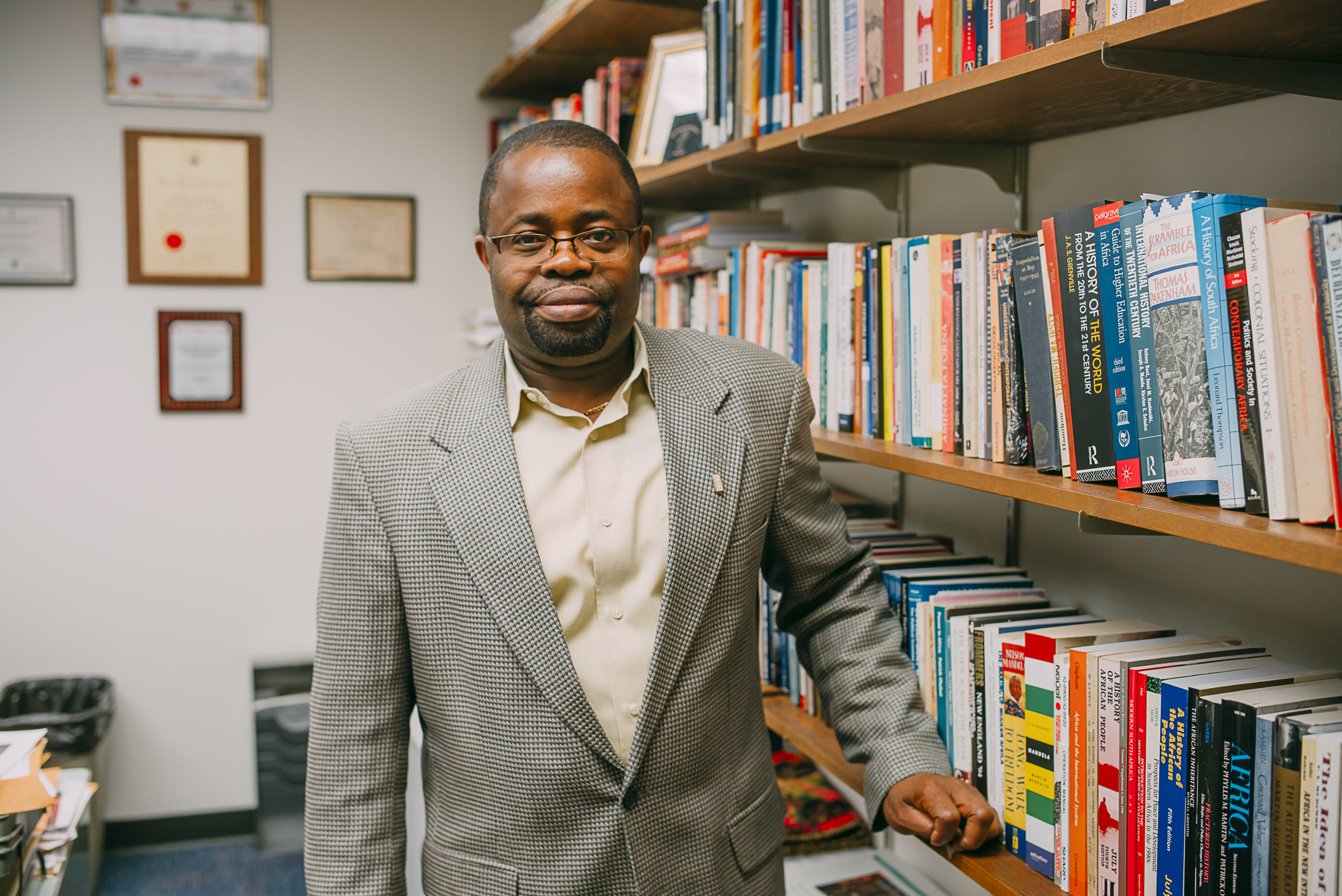Professor’s Work is a Blend of Academic Scholarship and African Affairs

Photo by Enoch Wu, Sentinel-Tribune
Professor Apollos Nwauwa’s teaching and research focus on modern Africa, especially colonial, post-colonial, intellectual and diaspora history. Born and educated in Nigeria, he completed graduate coursework at Dalhousie University in Halifax, Nova Scotia, Canada. After teaching at Rhode Island College and Brown University, he joined the BGSU department of history in 2000.
Nwauwa’s published works include “Imperialism, Academe, and Nationalism: Britain and University Education for Africans, 1860-1960,” book chapters and peer-reviewed articles featured in international journals. In addition to editing the volumes, “Between Tradition and Change: Sociopolitical and Economic Transformation Among the Igbo of Nigeria” and “Against All Odds: The Igbo Experience in Postcolonial Nigeria,” he serves on the editorial board of many journals.
A 2015 book Nwauwa co-edited with Julius O. Adekunle, “Nigerian Political Leaders: Visions, Actions and Legacies,” offers a retrospective of the country’s past political leaders and their legacies — good and bad. Four years in the making, the book features 20 scholars from the U.S. and Nigeria.
“No such comprehensive anthology on Nigerian political leaders exists,” Nwauwa said. “Leadership crises have remained the bane of Nigerian politics since the country gained its political independence from Britain in 1960.”
In 2016, Nwauwa and Adekunle edited a companion book, “Governance and Leadership in Nigeria: Prospects and Challenges,” with a focus on leadership principles and objectives.
Though Nwauwa has resided in Canada and the U.S.A. for much of his professional life, he has been very much involved in the life of his hometown, Uburuekwe, his Igbo ethnic group, and Nigeria in general. He has served as president of regional Igbo associations in the U.S., and in 2010 and 2011, he organized two of the most widely attended international conferences on Igbo studies in Washington, D.C.
Nwauwa serves as Secretary-General of Nigerians in the Diaspora Organization, Americas (NIDOA). The organization seeks to collaborate with the Nigerian government by contributing ideas, expertise and financial support. For example, one chapter of NIDOA has developed a model whereby members who have successful careers contribute to a fund for investing in real estate and manufacturing operations in the U.S. The profits would go toward further investments back in Nigeria, so members make a direct contribution to the economic growth of the country. According to some reports, “Nigerians in the U.S. have remitted over $70 billion [to Nigeria in] the past five years.”
Crediting his professional achievements to strong early support in his home country, Nwauwa has sought to give back. In fall 2015, he helped to coordinate a mission in which doctors and nurses travelled to his Uburuekwe, stayed in his family’s home and provided medical care to an estimated 600–1,000 individuals. He considers individual success to be a group effort, and plans to coordinate another medical mission to Nigeria in the future. He and his wife, Helen, have donated funds and materials to a wide variety of charitable campaigns to support their native home, including sponsoring indigent Uburuekwe students in schools and universities.
“One of my most difficult tasks continues to be correcting misrepresentations of African history—its land, peoples and cultures—in North America,” he continued. “These misconceptions feed on myths and stereotypes, which have been internalized. Thus, I strive to be creative and sensitive to students’ opinions and to foster open communication. I am pleased that feedback from my students indicate that they have become better-educated and even passionate and empathetic about African history.
“A traditional belief about the study of history is that the teacher plays the role of storyteller, and students are the listeners,” Nwauwa said. “But I believe it’s critical that there be incisive debates upon which the stories should be anchored. It has been my commitment that students be active participants in the discussion of stories and events. My blended teaching approach is intended to stir students’ curiosity to better understand not only what happened in the past, but also why.”
Updated: 12/01/2017 10:43PM

